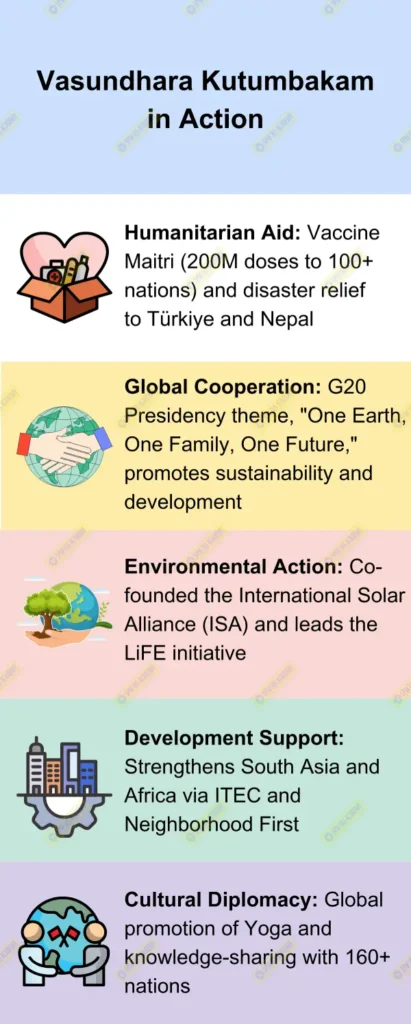“Vasudhaiva Kutumbakam” (often written as “Vasundhara Kutumbakam”), meaning “The World is One Family,” is a profound concept rooted in ancient Indian philosophy, originating from the Mahopanishad. This idea emphasizes a vision of universal kinship, where the entire world is viewed as an interconnected family, transcending divisions of nationality, race, or religion. The term “Vasundhara” represents the Earth, and this concept advocates for a sense of shared responsibility toward each other and the planet.
Origins and Philosophy
The phrase “Vasudhaiva Kutumbakam” finds its origins in the Mahopanishad (Chapter 6, Verse 72) and conveys that, despite individual identities, all of humanity belongs to a single family on Earth. This idea is deeply embedded in Indian spiritual and cultural thought, emphasizing compassion, tolerance, and peaceful coexistence. In Buddhism and Jainism as well, similar concepts promote a vision of interconnectedness, emphasizing empathy and non-violence.
Present-Day Relevance
In today’s globalized world, Vasudhaiva Kutumbakam holds significant relevance as countries increasingly face common challenges that require collective responses:
- Climate Change and Environmental Responsibility: The idea highlights our shared responsibility for the Earth, underscoring the need for collaborative efforts to address climate issues. Global climate conferences, such as COP26 and COP27, emphasize cooperation in fighting climate change, resonating with the concept of Vasudhaiva Kutumbakam.
- Public Health: The COVID-19 pandemic demonstrated how interconnected the world truly is, showing that global health crises can only be effectively managed through cooperation and support. India’s Vaccine Maitri initiative, providing COVID-19 vaccines to several countries, is a practical application of this philosophy.
- Economic and Social Inequality: In light of widening socio-economic disparities, Vasudhaiva Kutumbakam advocates inclusive growth, where resources and development benefit all, promoting international aid and cooperation to uplift disadvantaged regions.
Recent Events and Global Diplomacy
India has adopted Vasudhaiva Kutumbakam as a guiding principle in its foreign policy and international initiatives:
- G20 Presidency: Under India’s G20 presidency, the theme “One Earth, One Family, One Future” explicitly reflects Vasudhaiva Kutumbakam. This theme promotes global cooperation on climate action, sustainable development, and peace.
- International Day of Yoga: India’s promotion of Yoga as a global health practice embodies Vasudhaiva Kutumbakam, fostering unity and well-being.
- Humanitarian Assistance: India’s disaster relief efforts in neighboring countries, such as earthquake aid to Nepal and COVID-19 assistance to many nations, showcase its commitment to this philosophy.
Importance for India and the World
For India, Vasudhaiva Kutumbakam is a cultural cornerstone and a key principle in diplomacy, guiding its efforts in global peacebuilding and sustainable development. The concept aligns with India’s role as a soft power, promoting values of non-violence, tolerance, and cooperation.
Globally, adopting this philosophy fosters mutual respect and collective responsibility, crucial for addressing transnational issues like climate change, economic disparities, and pandemics. By embracing Vasudhaiva Kutumbakam, the world can work towards a future of shared prosperity, resilience, and lasting peace.
In essence, Vasudhaiva Kutumbakam is not only a timeless spiritual vision but also a practical framework for an increasingly interconnected and interdependent world. It serves as both an ethical foundation and a guiding vision for addressing global challenges collaboratively.












